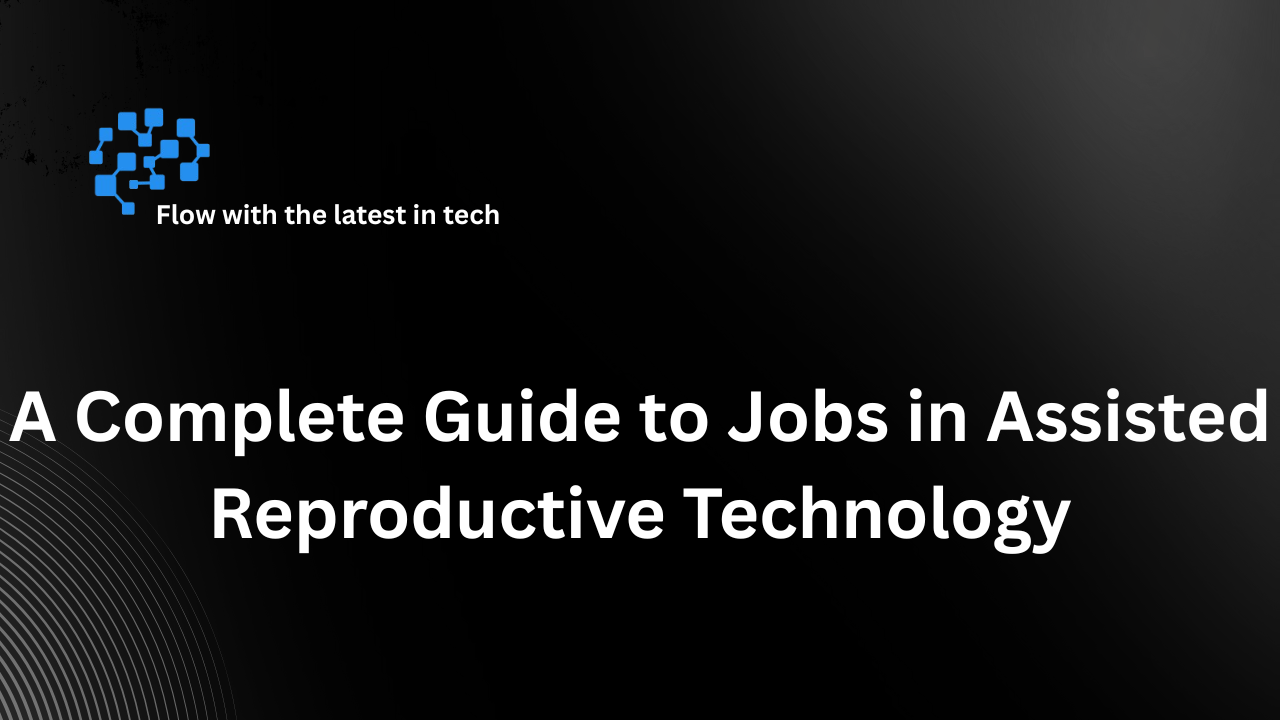Table of Contents
Introduction:
The healthcare business has traditionally been one of the most dynamic industries in the world responding swiftly to breakthroughs in science and technology. Assisted reproductive technology (ART) is one of the most groundbreaking sectors in healthcare. It helps people and couples who are having trouble getting pregnant.
As more and more people throughout the world want fertility treatments the number of jobs in assisted reproductive technology is growing quickly. From embryologists to fertility nurses lab technicians to counselors ART occupations are giving skilled people who wish to help others new chances to do so.
This book goes into detail about assisted reproductive technology jobs including what they are why they matter how to get a job in this sector the benefits and drawbacks important things to think about and a clear conclusion to help you decide if this is the correct career path for you.
What are jobs in assisted reproductive technology?
Jobs in assisted reproductive technology are professional occupations that help manage or directly carry out fertility treatments. In vitro fertilization (IVF) intrauterine insemination (IUI) egg freezing sperm donation surrogacy programs and more are all examples of ART.
People in these Jobs in Assisted Reproductive Technology help with the scientific clinical emotional and technical parts of fertility treatments. Some examples are:
Embryologists are scientists who work with eggs sperm and embryos in a lab.
Fertility Nurses are nurses who have been trained to help patients through the fertility process.
Lab technicians are people who do diagnostic tests and keep an eye on samples.
Counselors are professionals who help people with their feelings and provide them advice.
Administrative Staff—Coordinators who handle patient records appointments and insurance claims.
The demand for ART Jobs in Assisted Reproductive Technology continues to expand due to lifestyle changes delayed parenting and increased awareness of fertility treatments.
Why jobs in assisted reproductive technology are important
From both a social and medical point of view assisted reproductive technology jobs are quite important.
Increasing Rates of Infertility
Millions of people around the world are infertile. The World Health Organization says that roughly 1 in 6 people are infertile. Jobs in ART help with this problem.
Support for feelings
Fertility treatments can be quite hard on your emotions. Jobs in Assisted Reproductive Technology in counseling and patient care assist families deal with problems.
Progress in Science
ART occupations help with cutting-edge research which makes treatments more effective and easier to get.
Growth in the economy
The fertility business is now worth billions and skilled workers may expect job security and growth in this field.
Changes in Family Life
Assisted reproductive technologies help not only couples who can’t have kids but also LGBTQ+ families and single parents who want to have kids.
In short ART professions are important because they mix science kindness and hope.
How to Get a Job in Assisted Reproductive Technology
The way to get a job in assisted reproductive technology depends on what kind of work you want. Here’s a list:
1. Learning
Most embryologists need a master’s degree or a PhD in biology biotechnology or reproductive sciences.
To become a Fertility Nurse you need a nursing degree and extra training in reproductive health.
Most of the time lab technicians need a bachelor’s degree in medical technology or laboratory sciences.
Most of the time counselors have degrees in psychology social work or counseling as well as certifications in helping people with reproductive issues.
2. Training in a certain area
Getting certified in embryology IVF lab procedures genetic testing or reproductive endocrinology can help you get a better job.
3. Experience
Internships in hospitals research labs or reproductive clinics are a great way to get real-world experience.
4. Skills that are soft
In ART professions you need to be able to understand others be patient communicate well and solve problems.
5. Moving up in your career
Professionals can go on to higher positions like lab directors fertility program managers or university researchers.
Benefits of jobs in assisted reproductive technology
A Lot of Demand
There are a lot of job openings because more and more people seek fertility services.
Emotional Satisfaction
It feels great to help folks become parents.
Growth in your career
There are chances to specialize lead and do research.
Cutting-Edge Science ART experts work with the newest tools in genetics and medicine.
Different Roles
There are many different job routes available in ART from working in a lab to giving advice.
Opportunities Around the World
Fertility therapy is a global business that lets people work in other countries.
Disadvantages of Jobs in Assisted Reproductive Technology
Stress that is emotional
It can be emotionally draining to work with patients who are having trouble getting pregnant.
Long periods of training
Some jobs need you to have a master’s degree and years of study.
Hours that aren’t regular
Clinics typically need their workers to work on weekends holidays or at night.
A lot of responsibility
Mistakes made in the lab can change how well treatments work.
Risk of Burnout
It might be stressful to balance technical work with emotional assistance.
Ethical Dilemmas: Professionals may have to make tough choices about surrogacy choosing embryos or donor programs.
Important Things to Think About Before Starting in the Field
Here are some crucial things to think about if you want to work in assisted reproductive technology:
What drives you personally
Are you passionate about helping families become parents? Passion is important in this job, which is quite emotional.
Requirements for Education
Get ready for a lot of academic and hands-on training, especially if you want to work in a lab.
Emotional Strength
You will need to be able to help patients through both good and bad times.
Work Environment: People who work in ART frequently do so in labs clinics or hospitals. Think about whether this fits with your way of living.
Putting money into something
Some Jobs in Assisted Reproductive Technology need you to have a master’s degree or a certification which might be expensive.
Moving Around the World
This field has great worldwide job chances if you’re willing to work overseas.
Moral Beliefs
Think about whether your values match the way ART works.
Jobs in Assisted Reproductive Technology in the Real World
Embryologists who work at IVF clinics
They get sperm and eggs ready keep an eye on fertilization and choose embryos to move.
Counselors for Fertility
They help couples who are going through treatments deal with worry anxiety, or loss by giving them emotional support.
Reproductive Endocrinologists: These doctors, focus on hormones and fertility difficulties and often lead ART teams.
Cryopreservation Specialists: These are the people who freeze and store eggs sperm and embryos.
Coordinators for Patients
They handle scheduling insurance paperwork and function as a link between patients and medical professionals.
These Jobs in Assisted Reproductive Technology are all very important to the route to getting pregnant.
The Future of Jobs in Assisted Reproductive Technology
The need for ARTJobs in Assisted Reproductive Technology is likely to expand even further because of
Infertility rates are going up because of changes in lifestyle.
More families of many kinds are accepting ART.
Progress in AI genetic testing and lab automation.
More fertility clinics are opening up over the world.
As medical tourism in fertility expands new jobs may include AI specialists for choosing embryos bioinformatics professionals for genetic data and global patient coordinators.
Final thoughts
Jobs in assisted reproductive technology are at the crossroads of science health care and kindness. They give professionals a unique chance to make a difference in people’s lives while also working in one of the fastest-growing fields in medicine.
The field has its rewards but it also has its problems such high levels of responsibility long hours and emotional stress. You need to be strong dedicated and able to understand how others feel to do well in this job.
If you want to help people fulfill their dream of becoming parents are okay with the educational and moral requirements and are excited to work in a field that is growing and looking to the future then a career in assisted reproductive technology might be the right choice for you.
To sum up:
What do ART jobs do? Roles that help with fertility treatments.
Why is it important? They help families, fight infertility and encourage new ideas.
How to go after? By going to school getting training and getting real-world experience.
Pros: a lot of demand satisfaction and chances around the world.
Cons? Stress long training and moral problems.
What are the main things? Motivation strength education and putting money into something.
There are a lot of opportunities in the future for ART employment. For those who are ready to work hard it’s an opportunity to integrate science compassion and purpose into one meaningful job.

